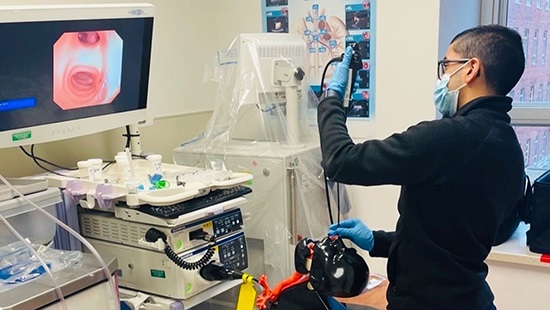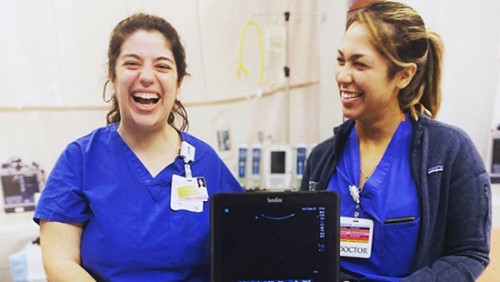Clinical Electives - Internal Medicine Residency
Residents choose from a wide variety of electives in both inpatient consults services and outpatient practices.
Medicine Subspecialties
- Cardiology, including Advanced Heart Failure/CCU electives
- Endocrinology
- GI
- Geriatrics
- Hematology
- Hepatology
- ID (general, HIV, oncology, transplant)
- Intermediate Care Unit
- International Health
- Nephrology
- Occupational Medicine
- Oncology, including Mixed Tumor Service elective
- Palliative Care
- Pulmonary
- Rheumatology
- Transplant Medicine
General Medicine
- Hospital Medicine
- Medical Consultation
- Patient Safety and Quality Improvement
- Hypertension
- Toxicology
- Women's health
Special Electives
- Medical Education
- Social Media
Other Electives
- Dermatology
- Neurology
- Orthopedics
- Psychiatry Liaison
Residents are encouraged to create their own electives that meet their educational needs - whether at Maryland or other sites around the country and the globe. Other innovative electives that are available include:
Hospital Medicine and Elective in Patient Safety and Quality Improvement
These two electives provide additional training for those interested in a career in hospitalist practice. Residents learn the art of medical consultation and perioperative medical management under the guidance of academic hospitalists. They participate in quality assurance projects and learn about the business aspect of hospital practice.

Interprofessionalism Pathways for Internal Medicine Residents
- HIV Interprofessionalism Pathway for Medical Residents: Includes clinical training, didactics and experiential learning integrated into your internal medicine training. Community engagement is integral to the program with residents attending JACQUES initiatives. Residents receive close mentoring on scholarly activity projects and produce a reflection piece at the end of the project. Residents receive up to $2000 to use toward conference attendance and society memberships. See this flyer for additional information.
- Interprofessionalism Pathway in Endocrinology: Clinical and didactic experiences in endocrinology, including diabetes, thyroid disease, hypercalcemia, obesity and transgender care. Residents engage in community encounters with social workers, diabetes educators and community health workers, and participate in scholarly activity through conference presentations, QI projects and abstract presentation at regional and national meetings.
HIV Service, Transplant ID, Oncology ID and International Health
In addition to the traditional ID elective, residents may spend time with the Transplant or Oncology ID service and manage patients with significant immunosuppression. On the HIV service, residents perform inpatient consultations and care for patients in a series of very active outpatient clinics. By designing an elective in International Health, residents may travel to research stations in Haiti, Central and South America, and Africa to engage in clinical and research activities. Through an endowment, funds are available to support travel for international electives.
Transplant Nephrology
As the academic medical center with one of the largest number of renal transplants performed annually in the US, residents have the opportunity for a vast clinical experience on this elective. Residents learn the basics of transplant biology, the evaluation of patients for transplantation, and the prevention and management of post-transplant complications. Residents work on an interdisciplinary team along with transplant nephrologists, infectious disease experts and surgeons.
Occupational Medicine
Under the supervision of specialists in Occupational Medicine, residents evaluate patients with job related illnesses, participate in ongoing research or may work with physicians at health facilities at industrial plants in Baltimore. See the Occupational Health Programs for more information. In addition, residents interested in a career in Occupational Medicine may link their curriculum at UMMC to the Occupational and Environmental Medicine Residency at Johns Hopkins University.
Geriatric Medicine
Residents participate in a multidisciplinary clinic evaluation of the elderly, engage in inpatient consultations, and care for patients in a nursing home. Outpatient clinics provide residents with training on the management of frail elderly, osteoporosis and older patients with multiple comorbidities.

Ph.D. Program for Clinicians
The PhD Program for Clinicians provides a rigorous, accelerated curriculum to train medical scientists for careers in basic or translational research in association with the research component of existing accredited residency and fellowship programs. PhD's are awarded through the Graduate Program in Life Sciences. These programs include: Biochemistry, Molecular Medicine, Molecular Microbiology and Immunology, Neuroscience, Physical Therapy and Rehabilitative Science, Epidemiology, Gerontology and Toxicology. See the Ph.D. Program for Clinicians for more information.



